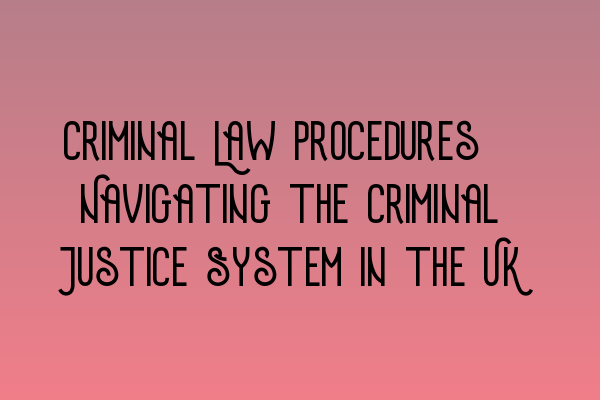Criminal Law Procedures: Navigating the Criminal Justice System in the UK
Welcome to SQE Criminal Law & Practice Law UK. In this blog post, we will guide you through the complex web of criminal law procedures and help you navigate the criminal justice system in the UK. Whether you are a law student, legal professional, or simply interested in understanding the intricacies of the criminal law system, this article is for you.
Understanding Criminal Law Procedures
Before delving into the specifics of criminal law procedures, let’s first define what criminal law is. Criminal law is a branch of law that deals with crimes committed against society as a whole. It encompasses a wide range of offences, from minor misdemeanours to serious felonies.
In the UK, criminal law procedures are governed by both statute law and common law principles. The Criminal Procedure Rules set out the framework for how criminal cases are dealt with in the courts, ensuring fairness and due process. These rules ensure that both the prosecution and the defence have a fair opportunity to present their case.
Now, let’s explore some key criminal law procedures that you should be familiar with:
1. Arrest and Detention
When a crime is suspected, the police have the power to arrest and detain individuals for questioning. Arrest and detention must be carried out in accordance with the law, and individuals have certain rights, such as the right to legal representation and the right to remain silent.
2. Charging and Bail
After an arrest, the police may decide to charge the individual with a specific offence. Charging involves formally accusing the individual of committing a crime. Depending on the seriousness of the offence, the individual may be released on bail or held in custody until their court appearance.
3. Court Proceedings
Once charged, the case will progress to court proceedings. This involves the gathering of evidence, witness testimonies, legal arguments, and ultimately, a judgment. It is essential to have competent legal representation to navigate the complexities of court proceedings successfully.
For a comprehensive guide on Demystifying the Solicitors Qualifying Examination Format, we recommend checking out our related article. This article explains the format and structure of the Solicitors Qualifying Examination (SQE), which is the main assessment for aspiring solicitors in the UK. Understanding the SQE format is crucial for those who wish to pursue a career in criminal law.
The Importance of Legal Representation
In criminal law cases, having effective legal representation is paramount. The consequences of a criminal conviction can be life-altering, affecting personal and professional reputation, employment prospects, and even liberty. It is essential to engage the services of a skilled criminal defence solicitor or barrister who will tirelessly advocate for your rights and ensure that you receive a fair trial.
If you are considering forming a Limited Liability Company (LLC), our article on LLC Formation Made Simple: Step-by-Step Guide for UK Entrepreneurs will provide you with a comprehensive overview of the process. This knowledge will be useful in understanding the legal aspects of forming and managing a business entity.
Appeals and Post-Conviction Options
Following a conviction, the defendant may have the right to appeal the decision. This involves presenting new evidence or arguing that errors were made during the trial process. Appeals require legal expertise and a thorough understanding of legal principles.
For a detailed overview of business regulations in the UK, we recommend reading our article on Business Regulations in the UK: A Comprehensive Overview. Understanding the regulatory environment is crucial for businesses operating within the confines of the law.
Preparing for the SQE exam? Our article on Preparing for the SQE Exam: Strategies and Resources for Success offers invaluable tips and resources to help you study effectively and achieve success in this challenging assessment.
Furthermore, consider attending our SQE Workshops and Webinars: Accelerate Your Exam Preparation to receive expert guidance and maximize your exam preparation.
Conclusion
Navigating the criminal justice system in the UK can be daunting, but with a solid understanding of criminal law procedures and the right legal representation, you can effectively navigate the complexities of the criminal justice system. Remember to seek expert advice and explore the resources available to you, such as our related articles, to enhance your understanding and improve your chances of a fair and just outcome.
